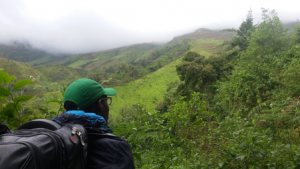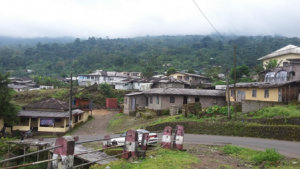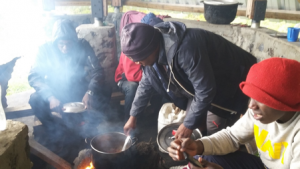By Ayonghe Akonwi Nebasifu, University of Helsinki
Ecological imperialism characterises much of the global ecological crises today. In seeking justice therefore, we must be cautious of its dangers. Take for instance, the institutionalised long-term inequalities, unfettered economic growth, to tensions over land distribution, that emerge from ecologically unequal exchanges of capitalism and their detrimental effects on both nature and the human environment.
Yet, as Harini Nagendra recently pointed out in a presentation for the HELSUS Global South Encounters, entitled ‘Nature in the City’, the Global South offers many sustainability insights. Indigenous knowledge in the South has been documented to provide a wealth of wisdom.
One way to address these egregious harms and learn from the Global South is to seek respectful engagement with the Global South. Africa stands out. It continues to suffer the indignities of intellectual marginalisation. A number of areas of cooperation between the Nordics and Africa would seem to offer an alternative, but doing so would require reconciling the respective parties’ knowledge systems. Are different “interests”, by definition, part of a solution? What role do the rule of law and governance play in balancing different interests? Addressing these critical questions requires analysing the stance of anthropocentrism, local knowledge and transformational change, building on my own work in the GreenPole project (2021-2025), funded by NordForsk.
Anthropocentrism in Policy Governance
Since the 1950s, the notion that both human and natural events contribute to the degradation of nature has been broadly acknowledged and critiqued. The consensus seems to be that nature is a force to be governed. This is capturedin the concept of anthropocentrism. Ideas have emerged since then to reconsider nature’s capacity to fulfil its potential, giving rise to post-anthropocentrism. These views are widespread in policy contexts.
Three cases illustrate the point. Start with the 1981 World Conservation Strategy. It was shaped by conservation agencies (UNEP, IUCN, FAO), which emphasised the need to preserve living resources for sustainable development. Similar views were put forward later, first in the UN Convention on Biological Diversity, and later in the Paris Agreement, which saw a shift to including climate mitigation within the Conference of Parties (COPs).
The second case is the goal of climate neutrality in 2050 set by the European Union (EU), which is to be met by member states through policies and legislation at multi-societal levels. When implemented, advocates envisage sweeping benefits for society, such as cleaner air, less waste, healthier food, as well as efficiency in energy and public transport.
The third example is the African Union (AU) and its regulatory stance on climate response. African countries have opportunities to improve upon their contributions to climate mitigation, possibilities that have been outlined in the African Union Climate Change and Resilient Development Strategy and Action Plan (2022-2023). Among the Plan’s visions is realising Africa’s Agenda 2063. An important emphasis here is support for regional collaboration through joint action and international partnerships, which embodies the hope of a citizen-driven, integrated, prosperous, and peaceful Africa.
It seems, therefore, that we should now go on to ask whether and how this progress might accommodate different interests in the use of nature or natural resources. A key process to explore in answering this question is knowledge integration among actors.
Science, local knowledge and transformational change
There is a need to ask: What lessons can policy governance learn from Indigenous and local communities who have used natural resources long before the coming of modern systems for conservation? My anthropological study with the peoples of the Mount Cameroon National Park in sub-Saharan West Africa (2015-2022), revealed transformative ways to reconcile the needs of biodiversity and local livelihoods (Figures 1, 2, 3).

Figure 1: Mount Cameroon National Park (Author’s data, 2017)

Figure 2: Community settlement, Mount Cameroon National Park (Author’s data, 2017)

Figure 3: Camping site, Mount Cameroon National Park (Author’s data, 2017)
Underpinning the successful reconciliation of these interests has been the agency people have displayed in complex policy environments to preserve their traditions. This has taken the form of behaviours reflecting cultural resilience in which people connect with nature in ways that sustain genetic resources. My research also delved into the potential that lies in management systems embracing collaboration, that is, where (and if) systems allow for coping mechanisms. We must, however, be cautious of risks for local knowledge to be overshadowed by top-down channels for decision-making. Such findings suggest a need for opportunities to make comparable observations in other regions – the Nordics, Africa and other sites globally – where state resource management may operate alongside human communities that have long had relations with nature.
Towards the Future
Ecological imperialism–where a dominant power controls trade, investment, labour, natural resources of peoples, and knowledge systems, both locally and globally – is harmful. It increases the risk of widening the burden of ecological degradation. As concerning are the uneven and unequal ramifications of ecological imperialism for both the Global North and the Global South. All is not lost. Despite dissimilar interests, there are possibilities to accommodate people, nature and policy governance alike. A certain co-creation is possible between the Global South and the Global North. For instance, the benefits of information exchange, sharing and collaboration in addressing the global ecological crisis could be fostered. Concepts such as participation, integration and inclusion, as well as their role in transformational change, invite rethinking in this respect.
With several questions of reconciliation that remain to be presented to various audiences in seeking better options for cooperation between people, nature and governance, interdisciplinary research projects are worth considering. Such studies would seem to offer new ways of agreeing on and addressing different needs in society, such as sustainability.
Where to go from this point is an open question. Personally, I look forward to researching new challenges in the near future with curiosity and hope. For instance, working with other investigators in the GreenPole project affords an opportunity to address many of the questions raised in this article, contributing in turn, to debates about the sustainable use of Nordic forests to deliver multiple benefits and values. Drawing on interviews with researchers, I plan to examine qualitative assessments of forest policy outcomes (climate, biodiversity, and wider societal impacts), synergies and trade-offs.
Such assessments may produce newer understanding about future changes of multifunctionality in the management of Nordic forests. A salient example, based on my ongoing interviews, is the term “anticipatory policy governance”, with which policy makers can minimize future risks in the Nordic Forest sector if applied systematically. This “anticipation” also includes practices of resilience, of re-evaluating, of reflecting and of learning across multiple actors, building the bricks of reconciliation one step at a time.
